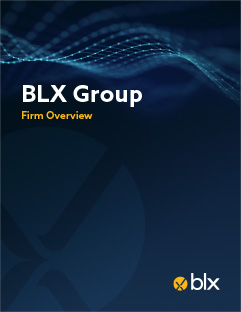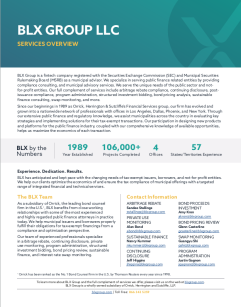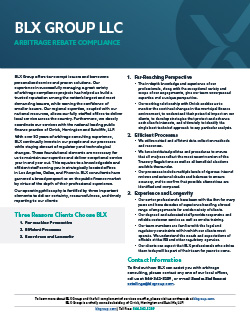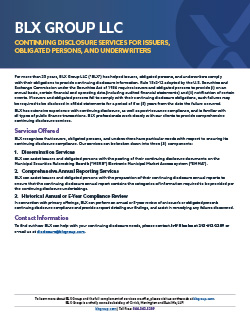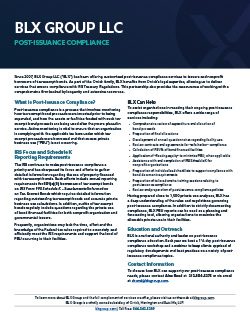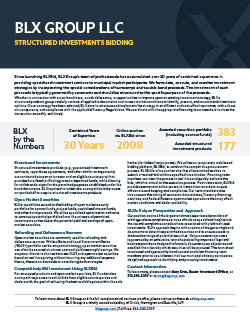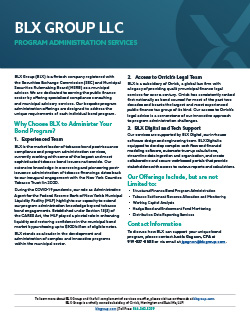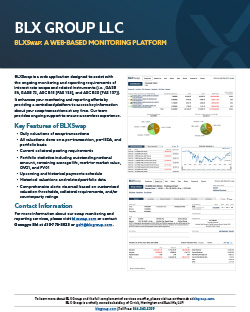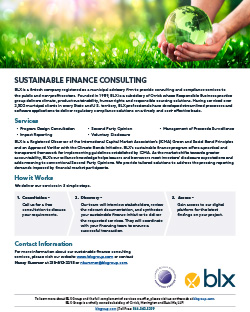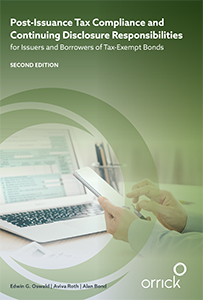
2025 PIC Workshop Agenda
- Day 1
- Day 2
| THURSDAY | October 23, 2025 | ||||
| START | SESSION | DURATION | SPEAKERS | ||
| 8:00 am | Registration/Breakfast (for in-person attendees) | 60 mins | |||
| 9:00 am |
Welcome and Opening Remarks | 5 mins
|
Alan Bond, BLX Sandee Stallings, BLX |
||
| 9:05 am |
WASHINGTON UPDATE AND INTRODUCTION TO POST-ISSUANCE COMPLIANCE | 40 mins
Post-Issuance Compliance (PIC) for tax-exempt bonds involves a range of ongoing responsibilities that issuers and borrowers must follow throughout the life of the bonds. These responsibilities include managing how bond proceeds are invested and spent, ensuring proper use of facilities funded by the bonds, and providing required disclosures to the secondary market. Maintaining a strong PIC program is crucial for preserving the tax-exempt status of the bonds. This session will cover the key components of an effective PIC program, highlight best practices and the advantages of a well-managed program, and give participants a foundation for the more detailed discussions that will take place during the workshop. In addition, a summary of the activity over the last year relating to tax reform and the “Big Beautiful Bill” will be covered. |
Alan Bond, BLX Ed Oswald, Orrick |
||
| 9:45 am |
PBU ESSENTIALS: RULES AND EXCEPTIONS | 50 mins
Issuers and borrowers are permitted only a limited amount of private business use (PBU) in facilities financed with tax-exempt bonds. The federal tax rules governing PBU are complex and require careful, ongoing oversight and monitoring throughout the life of the bonds. This session will offer a comprehensive overview of the rules and regulations related to PBU, including those that apply to unrelated trade or business use for 501(c)(3) organizations. It will also review which specific activities are considered qualified and nonqualified uses. Additionally, the panel will explain the exceptions to PBU and change in use rules. By understanding these rules and exceptions, issuers and borrowers can more effectively manage their tax-exempt financed facilities and may be able to increase revenue-generating activities while staying compliant with PBU requirements. |
Richard Chirls, Orrick Caleb Lansky, BLX Aviva Roth, Orrick |
||
| 10:35 am | BREAK | 15 mins | |||
| 10:50 am |
MANAGEMENT AND SERVICE CONTRACTS: RULES AND MEASUREMENT METHODOLOGY | 50 min
Contracts with third-party providers in bond-financed space can result in private business use (PBU), depending on how these agreements are structured. The IRS, through Revenue Procedure 2017-13, has outlined safe harbor requirements for service contracts in facilities financed with tax-exempt bonds. While these guidelines are generally useful, organizations must carefully apply these principles to reduce the risk of a noncompliant contracts and the associated PBU. This session will cover the safe harbors that apply to management and service contracts, offering practical guidance on how to structure agreements to meet safe harbor criteria. Additionally, the session will explain how to calculate PBU for management and service agreements, using specific examples to illustrate different types of calculations. |
Chas Cardall, Orrick Jessica Doherty, BLX Barbara Jane League, Orrick |
||
| 11:40 am |
SPONSORED RESEARCH: RULES AND MEASUREMENT METHODOLOGY | 50 mins
With increasing regularity, organizations are seeking ways to boost revenue, attract and retain faculty, and build partnerships with the private sector. Sponsored research and the related arrangements are often considered as part of these efforts. However, sponsored scientific research, research joint ventures, and third-party access in facilities financed with tax-exempt bonds can lead to private business use (PBU), based on how intellectual property rights from the research are handled. This session will explore these types of arrangements, explain the differences between basic and applied research, and review the IRS safe harbor rules for sponsored research outlined in Revenue Procedure 2007-47, all within the context of managing PBU limits for tax-exempt bonds. The session will also address how to calculate PBU for facilities where sponsored research takes place. Participants will gain the knowledge needed to make informed decisions about using bond-financed facilities for sponsored research and to structure agreements that comply with safe harbor requirements. |
Caleb Lansky, BLX Ed Oswald, Orrick Larry Sobel, Orrick |
||
| 12:30 pm | LUNCH BREAK | 60 mins | |||
| 1:30 pm |
SEC AND MUNICIPAL MARKET CONSIDERATIONS | 60 mins
Continuing disclosure for municipal debt offerings is essential for ensuring transparency for investors and regulators by providing ongoing information about the financial and operational status of the issuer or borrower. This session will detail the importance of providing more accurate, timely, and fulsome information to the market, featuring Dave Sanchez, Director of the SEC’s Office of Municipal Securities. Panelists will cover current regulatory expectations, recent enforcement trends, and best practices for municipal market disclosure obligations, including primary offering disclosures. Attendees will gain valuable insights into how to maintain compliance and avoid common pitfalls in secondary market disclosure. Don’t miss this opportunity to hear directly from a leading voice in municipal securities regulation. |
Robyn Helmlinger, Orrick Jeff Higgins, BLX Dave Sanchez, SEC |
||
| 2:30 pm |
AI AND MUNICIPAL BONDS | 45 min
AI is beginning to reshape the municipal finance industry, affecting trading, pricing, credit analysis, compliance, and disclosure. AI offers powerful new tools to collect, analyze, and distribute information more efficiently and transparently. Borrowers can leverage AI to help bridge the gap between the information they provide and what municipal bond buyers need, taking greater control over how their governance and credit risks are understood in the market. This empowers borrowers to proactively shape their own narratives and respond more effectively to investor concerns. While AI has the potential to reduce inefficiencies and improve access to critical data, its adoption requires careful oversight and ongoing evaluation. Our panelists will discuss how municipal market participants utilize AI and advanced data solutions in their operations while considering the evolving role of data providers in supporting the municipal bond market. |
Josh Cain, BLX Ken Hoffman, DPC Data Nancy Kummer, BLX |
||
| 3:15 pm |
PBU: TOP 10 (POTENTIAL) MISTAKES | 30 mins
Since only a limited amount of private business use (PBU) is permitted in tax-exempt financed facilities, managing third-party use can be challenging. Drawing on their extensive experience, our panelists will address common pitfalls and misconceptions about PBU, clarify what qualifies as acceptable use, highlight frequent errors in calculating PBU, and discuss ways to reduce existing PBU. Participants will leave better prepared to avoid common mistakes and manage the use of their facilities in compliance with PBU rules. |
Alan Bond, BLX Ed Oswald, Orrick |
||
| 3:30 pm | BREAK | 15 mins | |||
| 4:00 pm |
CHARTING YOUR COURSE: MUNICIPAL MARKET UPDATE AND INVESTMENT OPPORTUNITIES | 45 mins
The interest rate environment of the past few years has created both opportunities and challenges for organizations that utilize tax-exempt debt. While higher rates can make investing bond proceeds more attractive, they can also introduce new obstacles to bringing tax-exempt financings to market. This session will examine recent trends in debt issuance, highlight current challenges in issuing tax-exempt debt, and discuss the benefits and key considerations for investing in today’s market. Panelists will also cover the current reinvestment landscape with a focus on structured products, share practical examples of how to maximize earnings on bond proceeds, and outline steps organizations can take to capitalize on available investment opportunities. |
Stephen Curry, RGA Sam Goldstein, RBC Amy Kron, BLX Raigen Padayachee, TD Bank |
||
| 4:45 pm |
PREPARING FOR YOUR UPCOMING BOND ISSUANCE: NEW MONEY AND REFUNDINGS DONE RIGHT | 30 mins
As interest rates and market dynamics continue to shift, issuers and borrowers of tax-exempt bonds must be proactive, strategic, and well-prepared for upcoming financings, whether issuing new money or pursuing a refunding opportunity. This session provides a comprehensive overview of the practical considerations and critical documentation needed to position your organization for a successful bond issuance. |
Joshua Bonney, Orrick Cathleen Chang, Orrick Jenna Magan, Orrick |
||
| 5:30 pm | COCKTAIL RECEPTION (for in-person attendees) | 120 mins | |||
- Day 1
- Day 2

